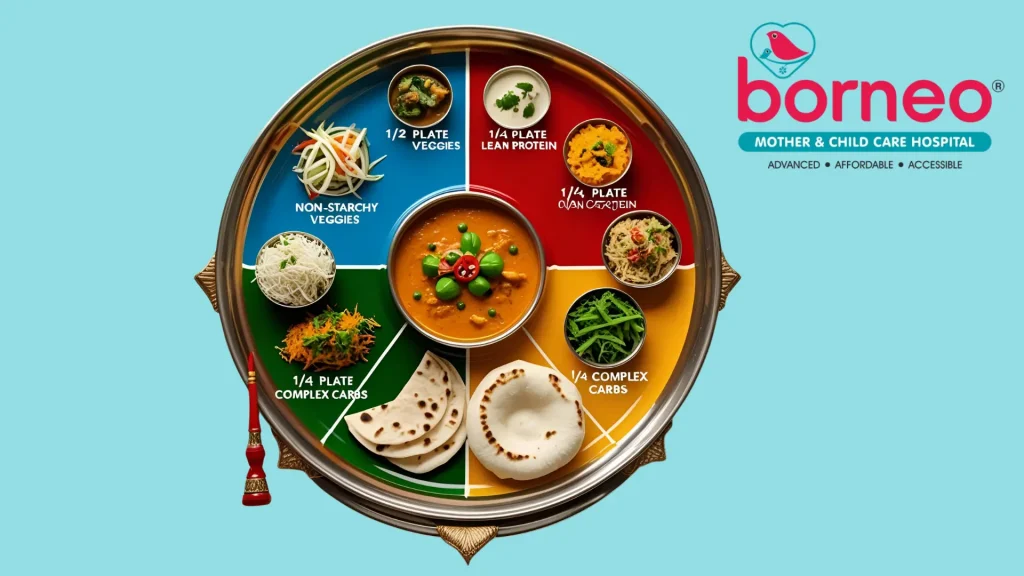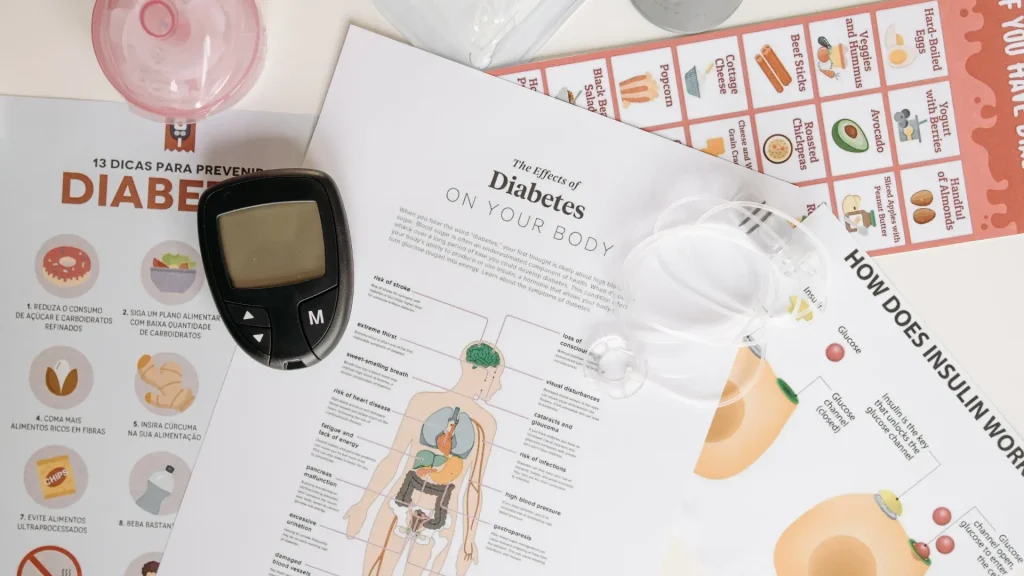In summary, receiving a diagnosis of gestational diabetes can feel overwhelming, but it is important to view it not as a setback but as an opportunity to take empowered control of your health for the well-being of yourself and your baby. This guide has provided a comprehensive, nutritionist-approved action plan to do just that.
We’ve detailed the cornerstones of management, focusing on a culturally relevant Indian diet plan for pregnant women with diabetes, the importance of mindful movement like a daily walk, and the necessity of regular blood sugar monitoring. These strategies are your primary tools for navigating this challenge successfully.
Ultimately, this proactive approach is the essence of modern high-risk pregnancy care. You are absolutely not alone in this journey. While the diet and lifestyle plan outlined here is a powerful starting point for your healthy pregnancy, a personalised plan created through one-on-one nutrition counselling for pregnant women is the gold standard for achieving the best outcomes.
Remember, managing gestational diabetes is a team effort between you and your healthcare providers. With the right support and a dedicated plan, you can confidently manage this condition and look forward to welcoming a healthy, happy baby.
Introduction
Hearing the words “gestational diabetes” during your pregnancy can be frightening. Your mind might be filled with questions and worries. But the first thing we want you to do is take a deep breath. A diagnosis of gestational diabetes is not a sign that you’ve done anything wrong, and with the right plan, you can absolutely have a healthy pregnancy and a healthy baby. This diagnosis simply means your pregnancy now requires a bit of extra attention, which we call high-risk pregnancy care.
At Borneo Hospitals, our team of obstetricians and nutritionists sees this as an opportunity to empower you. Managing gestational diabetes is mainly about making smart and consistent choices with your diet and lifestyle. To help you get started right away, our nutrition experts have created this clear, practical guide, with a special focus on an Indian pregnancy diet.
What is Gestational Diabetes? A Simple Explanation
Gestational Diabetes Mellitus (GDM) is a type of diabetes that occurs for the first time during pregnancy. Pregnancy hormones can sometimes make it harder for your body to use insulin effectively.
This causes your blood sugar levels to rise, which can affect your health and your baby’s development if not managed properly. The good news? For most women, it goes away soon after delivery. Our goal is to manage it beautifully until then.
The Cornerstones of Management: Diet, Exercise, and Monitoring
Effective management of gestational diabetes and high-risk pregnancy care stands on three strong pillars:
- A Balanced Diet: This is the most powerful tool you have.
- Moderate Exercise: Gentle, regular movement helps your body use insulin better.
- Regular Monitoring: Checking your blood sugar levels tells you how your plan is working.
Your Indian Diet Plan for Pregnant Women with Diabetes
Forget about complicated or foreign meal plans. You can manage gestational diabetes wonderfully with the wholesome food in your own kitchen. This is what our nutrition counselling for pregnant women focuses on.

The Golden Rules of Eating
- Eat Small, Frequent Meals: Instead of three big meals, aim for three main meals and two to three small snacks. This keeps your blood sugar stable.
- Don’t Skip Meals: Skipping meals, especially breakfast, can cause your blood sugar to fluctuate.
- Balance Your Thali: Every main meal should be a mix of complex carbohydrates, lean protein, and healthy fats.
- Stay Hydrated: Drink plenty of water throughout the day.
Building a Balanced Indian Thali: What to Eat
- Complex Carbohydrates (Choose wisely): Opt for whole grains like whole wheat roti/chapati, brown rice, millets (jowar, bajra, ragi), and oats.
- Lean Proteins (Fill up on these): Dal, legumes (chickpeas, kidney beans), paneer, tofu, eggs, chicken, and fish are excellent choices.
- Vegetables (Eat freely): All non-starchy vegetables are your best friends. Think spinach (palak), cauliflower (gobi), okra (bhindi), tomatoes, and cucumbers.
- Fruits (In moderation): Choose low-glycemic fruits like apples, pears, oranges, and berries. Limit portions to one small fruit at a time.
- Healthy Fats: Include nuts, seeds, and avocado in moderation.
Foods to Limit or Avoid
- Sugary Foods: Mithai, cakes, biscuits, sugary drinks, and juices should be avoided.
- Refined Grains: White bread, white rice, maida, and suji can cause a rapid spike in blood sugar.
- Starchy Vegetables: Limit potatoes, sweet potatoes, and corn.
- Fried Foods: Avoid samosas, pakoras, and other deep-fried items.
A Sample One-Day Meal Plan
- Early Morning: 1 glass of milk without sugar + a handful of soaked almonds.
- Breakfast: 1-2 ragi dosas with sambar OR 1 bowl of vegetable poha.
- Mid-Morning Snack: 1 apple OR a bowl of dahi.
- Lunch: 1-2 multigrain rotis, 1 bowl of dal, 1 bowl of green vegetable sabzi, and a large bowl of salad.
- Evening Snack: 1 bowl of boiled chana chaat OR a glass of buttermilk (chaas).
- Dinner: Similar to lunch, but ensure it’s at least 2 hours before bedtime.
- Bedtime Snack: 1 small glass of milk.
Beyond the Plate: Essential Lifestyle Changes for a Healthy Pregnancy
The Power of a Daily Walk
Aim for a 20-30 minute brisk walk after your main meals, especially after lunch and dinner. This simple activity is incredibly effective at helping your body process the sugar from your food and is a safe pregnancy exercise.
The Importance of Monitoring Your Blood Sugar
Your high-risk pregnancy doctor will ask you to check your blood sugar levels at home with a small device called a glucometer. You’ll likely need to check it when you wake up (fasting) and 1-2 hours after each main meal. Keeping a log of these readings is crucial.

Why This is Considered High-Risk Pregnancy Care
A GDM diagnosis requires a collaborative team approach.
The Role of Your Obstetrician and Nutritionist
- Your obstetrician (a gynaecologist specialising in pregnancy) will monitor you and your baby’s health closely. They will work with a nutritionist or a dietitian for pregnancy to create a personalised plan just for you. This close supervision is what defines good high-risk pregnancy care and ensures the best outcome for both you and your baby.
You Are in Control: Your Path to a Healthy Baby
In summary, receiving a diagnosis of gestational diabetes can feel overwhelming, but it is important to view it not as a setback, but as an opportunity to take empowered control of your health for the well-being of yourself and your baby. This guide has provided a comprehensive, nutritionist-approved action plan to do just that.
We’ve detailed the cornerstones of management, focusing on a culturally relevant Indian diet plan for pregnant women with diabetes, the mindful movement of a daily walk, and the necessity of regular blood sugar monitoring. These strategies are your primary tools for navigating this challenge successfully.
Ultimately, this proactive approach is the essence of modern high-risk pregnancy care. You are absolutely not alone in this journey. While the diet and lifestyle plan outlined here is a powerful starting point for your healthy pregnancy, a personalised plan created through one-on-one nutrition counselling for pregnant women is the gold standard for achieving the best outcomes.
Remember, managing gestational diabetes is a team effort between you and your healthcare providers. With the right support and a dedicated plan, you can confidently manage this condition and look forward to welcoming a healthy, happy baby.
Consult Our Experts
Every pregnancy is unique, and so is your health plan. For personalised high-risk pregnancy care and a detailed diet plan tailored to your needs, we encourage you to consult with the expert doctors at Borneo Hospitals.
You can visit your nearest Borneo Hospital branch in Thane, Nashik, Waluj, or Raipur.
If it’s easier for you, you can also call our helpline for advice. We invite you to make an appointment with our esteemed Obstetrician and Gynaecologist, Dr. Vrushali Pillai (MBBS, DGO). She and our team of nutritionists will partner with you to ensure a safe and healthy pregnancy journey.
Further Reading & Authoritative Sources
- World Health Organisation (WHO): Diabetes – Fact Sheet (Provides global context on diabetes).
- FOGSI (Federation of Obstetric and Gynaecological Societies of India): Good Clinical Practice Recommendations on Gestational Diabetes Mellitus
- American Diabetes Association (ADA): Gestational Diabetes
- The Lancet (Research Paper) on GDM in India: Gestational diabetes mellitus in India: A review of the evidence



